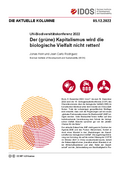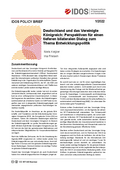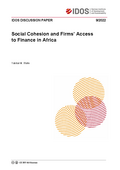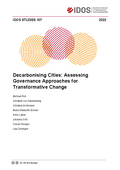-

Publikationen
Photo: www.shutterstock.com/de/image-photo/pont-du-gard-old-roman-aqueduct-45688924
Publikationen
Das German Institute of Development and Sustainability (IDOS) gibt vier eigenständige Publikationsreihen heraus. In Discussion Papers, Policy Briefs und Studies veröffentlichen die Wissenschaftler*innen des IDOS ihre aktuellen Forschungsergebnisse. Auch Gastwissenschaftler*innen und Kooperationspartner haben die Möglichkeit, ihre Forschungsergebnisse in einer der IDOS-Reihen zu publizieren. Publikationen der 2022 eingestellten Reihen Analysen und Stellungnahmen, Briefing Paper sowie Two-Pager / Zweiseiter sind weiterhin online verfügbar. Die vierte Publikationsreihe ist für Meinungsbeiträge vorgesehen: Regelmäßig kommentiert die Aktuelle Kolumne die neuesten Entwicklungen und Themen der internationalen Entwicklungspolitik.
Wissenschaftler*innen des IDOS veröffentlichen ihre Forschungsergebnisse zudem regelmäßig in referierten und nicht referierten deutschen und internationalen Fachzeitschriften und Publikationsreihen anderer Forschungseinrichtungen und Institutionen sowie bei renommierten Buchverlagen. Zusätzlich nutzen sie Blogs und Online-Plattformen der Partnerinstitutionen, um die Forschungs- und Beratungstätigkeit des Instituts einer interessierten Öffentlichkeit zu vermitteln.
Es wurden 9386 Ergebnisse gefunden. Zeige Ergebnisse 21 bis 30 von 9386.
-
Vulnerability and resilience: crisis transmission channels for GVCs in COVID times
-
Waste separation in Indonesia (Dataset)
-
State fragility and development cooperation: putting the empirics to use in policy and planning
-
The measurement of poverty
-
The role of framing and effort in green nudging acceptance
-
Improving innovation adoption among African smallholder farmers
-
The European Union's new Ukraine facility: an important though insufficient step?
-
The dichotomous world of sanitation management: ‘Matter out of place’ in urban India
-
Sanitation in a changing world: the need for a paradigm shift in the mindset of development agencies
-
Introduction: transnational cooperation – an explorative collection












